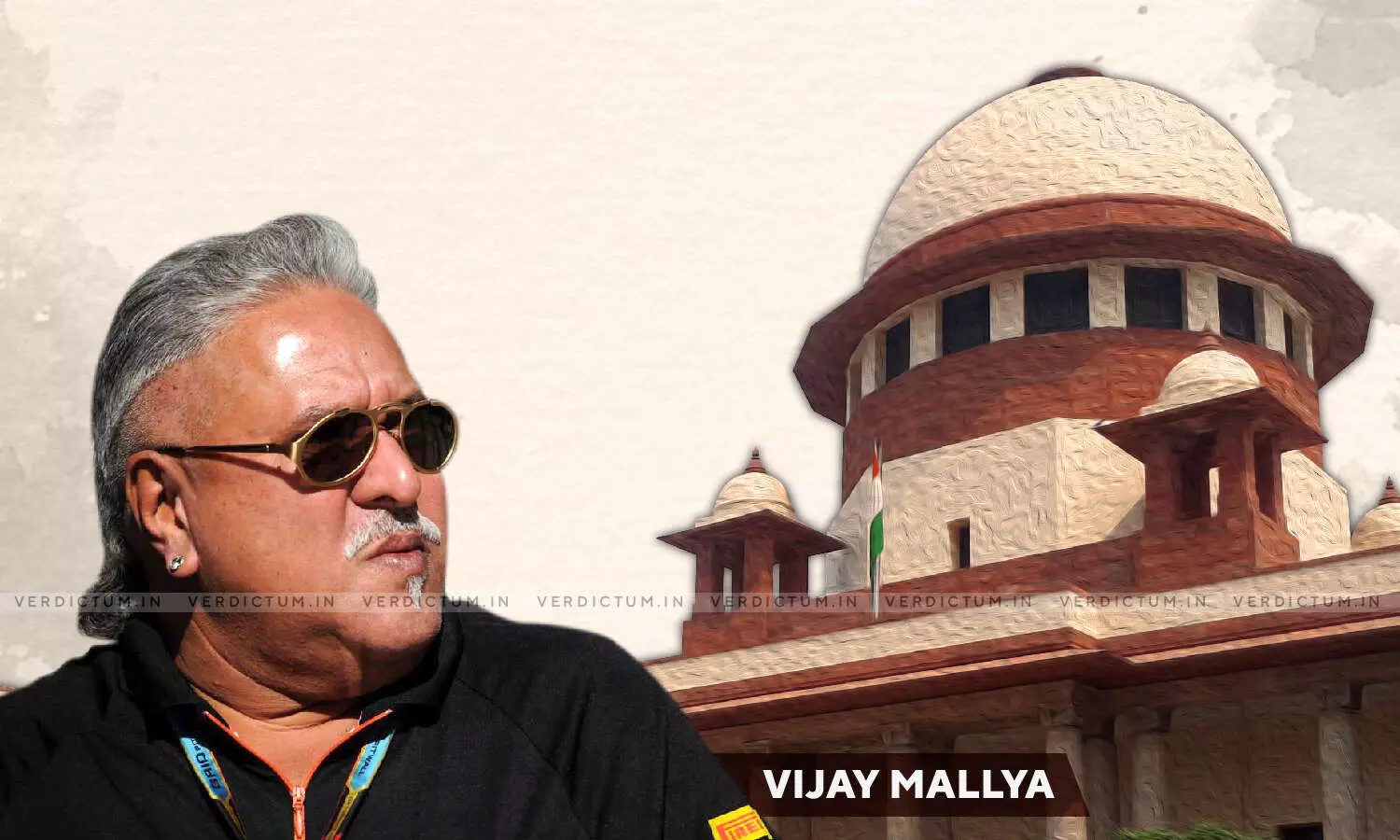
Breaking: Supreme Court Sentences Vijay Mallya To Four Months Imprisonment For Contempt Of Court
 |
|The Supreme Court today sentenced Vijay Mallya to four months imprisonment for committing contempt of Court. The Court has also imposed a fine of Rs.2000 on Mallya.
The Court has also directed Mallya to deposit the 40 Million US Dollar with eight per cent interest, within four weeks.
The Bench comprising of Justice U. U. Lalit, Justice S. Ravindra Bhat and Justice PS Narasimha said that Mallya did not show any remorse for his conduct and that it is necessary to impose the sentence to uphold the majesty of law.
The Apex Court while reserving its order on the quantum of the sentence in the contempt case against Vijay Mallya, had observed that Vijay Mallya is not in custody in the United Kingdom and he is a free person there and can move around. The only reason given is that there are proceedings initiated against him.
While considering the punishment for contempt, the Amicus Curiae had submitted that while giving the punishment, the difficulty that the Court would face would be the absence of the contemnor. Amicus went on to submit that sequestration would be a way by which the contemnor may be punished or both the ways punishment as well as sequestration can be used.
The Bench then raised the question as to whether the assets can be retrieved because the assets in India are already attached in other cases and the foreign assets and money have been transferred to his family members by way of gratuitous transfers. The Court had asked whether such transactions can be reversed and money be received.
Amicus had submitted that, "Your lordships may reverse the transaction. But your power of sequestration isn't limited to that transaction, some other asset of his can also be sequestered." The Counsel for the banks submitted that the recovery officer is well equipped to go after the money.
Counsel for Vijay Mallya had appeared before the Court and submitted that the previous orders were brought to the notice of the contemnor and handed over a copy of communication between him and the contemnor which stated the inability to provide any information on the pending proceedings in the United Kingdom.
The Bench noted, "It is, thus, well settled that apart from punishing the contemnor for his contumacious conduct, the majesty of law may demand that appropriate directions be issued by the court so that any advantage secured as a result of such contumacious conduct is completely nullified. The approach may require the court to pass directions either for reversal of the transactions in question by declaring said transactions to be void or passing appropriate directions to the concerned authorities to see that the contumacious conduct on the part of the contemnor does not continue to enure to the advantage of the contemnor or any one claiming under him."
Further, the Court added, "Mere passing of an order of punishment as stated by this Court in Pravin C. Shah v. K.A. Mohd. Ali & Anr. would not be enough or sufficient. In a given case, to meet the ends of justice, the concept of purging of the contempt would call for complete disgorging of all the benefits secured as a result of actions which are found by the court to be contumacious."
The Court also noted that in its order dated 9.5.2017, the Apex Court had found that the action on the part of the contemnor in disbursing the amount of US$ 40 million was against the text and tenor of orders passed by the High Court of Karnataka and that the Contemnor was guilty of contempt
"In the circumstances, in order to maintain the majesty of law, we must impose adequate punishment upon the Contemnor and must also pass necessary directions so that the advantages secured by the Contemnor or anyone claiming under him are set at naught and the amounts in question are available in execution of the decrees passed in the concerned Recovery Proceedings," the Bench opined.
"Considering the facts and circumstances on record and the facts that the Contemnor never showed any remorse nor tendered any apology for his conduct, we impose sentence of four months and fine in the sum of Rs.2,000/- (Rupees Two Thousand Only) upon the Contemnor. The fine shall be deposited in the Registry of this Court within four weeks and upon such deposit, the amount shall be made over to the Supreme Court Legal Services Committee. In case the amount of fine is not deposited within the time stipulated, the Contemnor shall undergo further sentence of two months." the Court directed.
The Court also directed, "We direct the Ministry of Home Affairs, Government of India, New Delhi to secure the presence of the Contemnor to undergo the imprisonment imposed upon him. Needless to say, Government of India including the Ministry of External Affairs and all other agencies or instrumentalities shall carry out the directions issued by this Court with due diligence and utmost expediency. A Compliance Report shall thereafter be filed in the Registry of this Court."
The Supreme Court had, on a petition filed by the banks alleging that Vijay Mallaya was not disclosing his assets and that while he owed money to the tune of Rs. 9000 crores and had transferred an amount of $40 million to his children, held that Vijay Mallya was guilty of disobeying the orders passed by the Court.
(This story has been updated after the receipt of the Order).
Click here to read/download the Order